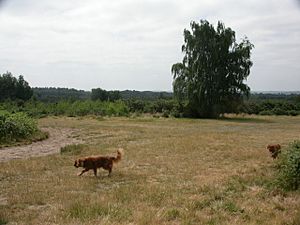Bramshott and Ludshott Commons facts for kids
| Site of Special Scientific Interest | |

Ludshott Common
|
|
| Area of Search | Hampshire |
|---|---|
| Interest | Biological |
| Area | 374.4 hectares (925 acres) |
| Notification | 1984 |
| Location map | Magic Map |
Bramshott and Ludshott Commons is a very special natural area located near Grayshott in Hampshire, England. It covers a large space, about 374.4 hectares, which is roughly the size of 925 football fields! This area is protected because it's home to unique plants and wildlife.
It's officially known as a Site of Special Scientific Interest (SSSI). This means the land is important for its plants, animals, or geology, and it's protected by law to keep it safe. Bramshott and Ludshott Commons is also part of a bigger protected area called the Wealden Heaths Phase II Special Protection Area. This larger area helps protect important bird species and their habitats.
Contents
What Makes This Place Special?
A Home for Unique Plants
Bramshott and Ludshott Commons is mostly made up of heathland. This is a special type of habitat with open, low-growing plants. The main plants you'll see here are different kinds of heather, like common heather and bell heather. You'll also find gorse, which is a spiky, yellow-flowered bush, including common gorse and dwarf gorse. These plants create a beautiful landscape and provide food and shelter for many animals.
Ancient Trees and Tiny Life
Besides the open heathland, there are also areas of old woodland with very old trees. These ancient trees are home to many different types of lichens. Lichens are fascinating living things that are actually a mix of a fungus and an algae living together. The lichens found here are mostly epiphytic, which means they grow on the surface of plants, like tree bark, without harming them.
Scientists have found at least 87 different kinds of lichens (called taxa) at Bramshott and Ludshott Commons. Many of these lichens are usually found on very old trees, and some of them are quite rare. This shows how important these ancient woodlands are for tiny, unique life forms.
Why is it Protected?
This area was officially recognized as a Site of Special Scientific Interest in 1984. Protecting Bramshott and Ludshott Commons helps make sure that its special heathland, ancient trees, and the many plants and animals that live there can continue to thrive for many years to come. It's a great example of how we can protect important natural spaces.

